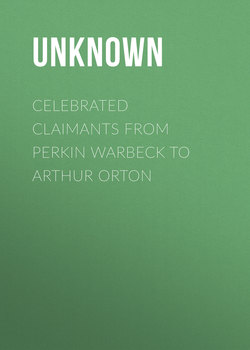Читать книгу Celebrated Claimants from Perkin Warbeck to Arthur Orton - Unknown - Страница 13
На сайте Литреса книга снята с продажи.
JOHN NICHOLS THOM, ALIAS SIR WILLIAM COURTENAY
ОглавлениеIn 1830 or 1831 a Cornishman, named John Nichols Thom, suddenly left his home, and made his appearance in Kent as Sir William Courtenay, knight of Malta. He was a man of tall and commanding appearance, had ready eloquence, and contrived to persuade many of the Kentish people that he was entitled to some of the fairest estates in the county, and that when he inherited his property they should live on it rent free. This pleasant arrangement agreeing with the views of a large proportion of the agriculturists, they entertained him hospitably, and made no secret of their impatience for the arrival of the happy time of which he spoke. Unfortunately Thom became involved in some smuggling transaction, and having been found guilty of perjury in connection with it, was sentenced to six years' transportation. After his condemnation it was discovered that he was insane, and his sentence was not carried out, but he was removed from Maidstone gaol to the county lunatic asylum, where he remained four years. In 1837 he was released by Lord John Russell, who considered that he was sufficiently recovered to be delivered up to the care of his friends. They, however, failed to discharge their duty efficiently; and in 1838, Thom reappeared in Kent, conducting himself more extravagantly than ever. The farmers and others supplied him with money, and he moved about the county delivering inflammatory harangues in the towns and villages—harangues in which he assured his auditors that if they followed his advice they should have good living and large estates, as he had great influence at court, and was to sit at her majesty's right hand on the day of the coronation. He told the poor that they were oppressed and down-trodden by the laws of the land, and invited them to place themselves under his command, and he would procure them redress. Moreover, he assured those whose religious convictions were disturbed, that he was the Saviour of the world; and in order to convince them, pointed to certain punctures in his hands, as those inflicted by the nails of the cross, and to a scar on his side, as the wound which had discharged blood and water. By these representations he succeeded in attaching nearly a hundred people to himself.
On the 28th of May he set out at the head of his tatterdemalion band from the village of Boughton, and proceeded to Fairbrook. Here a pole was procured, and a flag of white and blue, representing a rampant lion, was raised as the banner which was to lead them to victory. From Fairbrook they marched in a kind of triumphal procession round the neighbouring district, until a farmer of Bossenden, provoked by having his men seduced from their employment by Thom's oratory, made an application for his apprehension. A local constable named Mears, assisted by two others, proceeded to arrest the crazy impostor. After a brief parley, Thom asked which was the constable; and on being informed by Mears that he held that position, produced a pistol, and shot the unoffending representative of the law, afterwards stabbing him with a dagger. The wounds were almost immediately fatal, and the body was tossed into a ditch. The remaining constables fled to the magistrates who had authorised them to make the capture, and reported the state of affairs. When the intelligence of Mears's death spread abroad, the general indignation and excitement was very great, and a messenger was despatched to fetch some soldiers from Canterbury. A military party soon arrived, but their approach had been heralded to Thom and his strolling vagrants, who had betaken themselves to the recesses of Bossenden wood, where the soi-disant Sir William, by his wild gesticulations and harangues, roused his adherents to a pitch of desperate fury. To show his own valour, as soon as the soldiers, who were intended rather to overawe than injure the mob appeared, he strode out from among his ignorant attendants, and deliberately shot Lieutenant Bennett of the 45th regiment, who was in advance of his party. The lieutenant fell dead on the spot. The soldiers, excited by the murder of their leader, immediately returned the fire, and Thom was one of the first killed. As he fell, he exclaimed, "I have Jesus in my heart!" Ten of his adherents shared his fate, and many were severely wounded. Some of the more prominent among his followers were subsequently arrested, tried, and found guilty of participating in Bennett's murder. Two of them were sentenced to transportation for life; one had ten years' transportation, while six expiated their offences by a year's imprisonment in the House of Correction.
